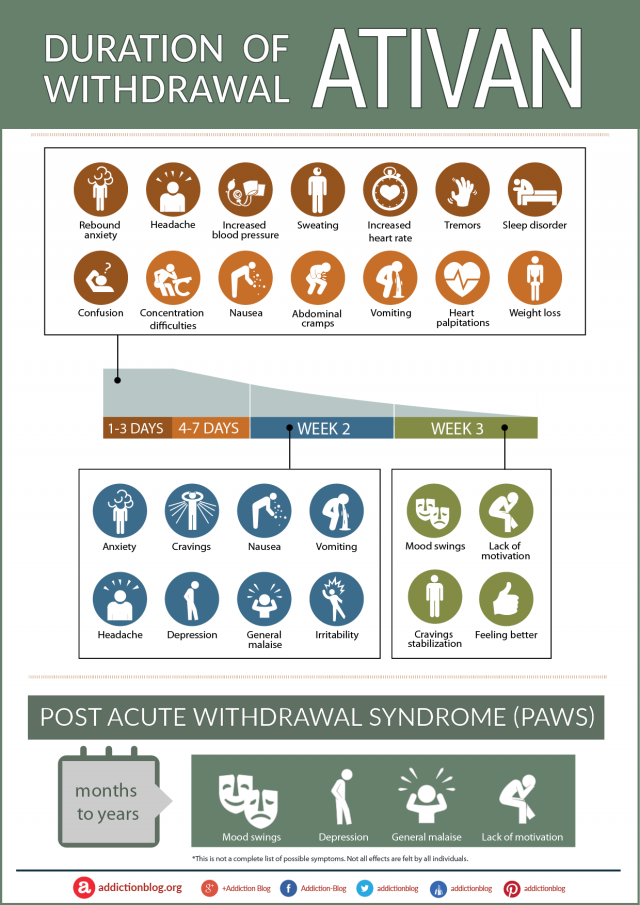TABLE OF CONTENTS
- Overall Duration
- What’s Withdrawal Like?
- The Safest Way to Withdraw
- 24-72 Hours After Last Dose
- 4-7 Days After Last Dose
- 2 Weeks After Last Dose
- 3 Weeks After Last Dose
- Factors that Influence Duration
- A Realistic Timeline
ARTICLE SUMMARY: Never attempt to withdraw Ativan on your own. It can be dangeous and lead to multiple complications. Continue reading for more on how to safely manage coming off this strong benzodiazepine.

Overall Duration
It can take weeks to months to completely withdraw from Ativan. This is because with repeated daily dosing, accumulation occurs and high concentrations can build up in the body (mainly in fatty tissues). The symptoms of Ativan withdrawal may appear as soon as 4 to 8 hours after the last dose, and withdrawal symptoms usually manifest within 48 hours. However, some signs of withdrawal may not manifest for up to 7 to 10 days after stopping chronic use.
On the other hand, physical dependence develops relatively quickly. This is because Ativan is a benzodiazepine, a strong central nervous system depressant. It affects the brain.In fact, anyone who has taken a benzodiazepine like Ativan for longer than 3–4 weeks is likely to have withdrawal symptoms if the drug is ceased abruptly. These symptoms require time in order to resolve.
NOTE HERE: It is important that you seek medical supervision when you are ready to stop taking Ativan. Symptoms can be serious and include seizures. Mild withdrawal symptoms include a depressed mood and trouble sleeping. However, these symptoms can persist for weeks or months.
What’s Withdrawal Like?
What can you expect during Ativan withdrawal?
Whether you’re taking Ativan prescribed by a physician or bought on the black market, know that anyone who is physically dependent on Ativan is at risk for an acute withdrawal syndrome that is clinically indistinguishable from alcohol withdrawal. Risk factors for severe withdrawal include:
- comorbid medical or psychiatric problems
- longer time of use
- older age
- taking larger doses of Ativan chronically
Further, this type of benzodiazepine withdrawal is characterized by many signs that are opposite to the therapeutic effects of the drug. So, you can expect rebound anxiety or insomnia. In more severe cases, some people may experience seizures. We explain a week-by-week picture of the details in the following schedule.
The Safest Way to Withdraw
The safest way to manage withdrawal from Ativan is under medical supervision where you can get all support you need. Because lorazepam has a medium-term onset of action, sometimes doctors will transfer you to longer-acting drugs such as diazepam or nitrazepam. The Australian Prescriber, an Australian medical journal, outlined these possible dosing substitutions in 2015. For others, the transfer may be problematic and the drug may have to be substituted in a stepwise manner. This is why medical help is essential.
24-72 hours after the last dose
The initial indication of withdrawal from Ativan is an elevation of vital signs such as heart rate, blood pressure, and temperature. Tremors develop next, first a fine tremor of the hands and fasciculation of the tongue, sometimes followed by gross tremors of the extremities. Disorientation and mild hallucinations (often auditory, occasionally visual) may develop as the syndrome progresses, accompanied by sweating. Seizures can also occur during this time.
- Confusion
- Headache
- Increased blood pressure
- Increased heart rate
- Sleep disorder
- Sweating
- Tremors
4-7 Days after last dose
- Abdominal cramps
- Concentration difficulties
- Heart palpitations
- Insomnia, anxiety and nausea are at their peak
- Risk of seizures
- Vomiting
2 Weeks After Last Dose
- Anxiety
- Cravings
- Depression
- General malaise
- Headache
- Irritability
- Nausea
- Rebound anxiety
- Rebound insomnia
- Vomiting
3 Weeks After Last Dose
- Cravings stabilization
- Feeling better
- Lack of motivation
- Mood swings
NOTE HERE: PAWS, post acute withdrawal symptoms, such as drug craving, depression, or irritability may appear at any time during the withdrawal times for Ativan.
Factors that Influence Duration
Know that the length of Ativan withdrawal is different from each individual; in face, the length of time you spend in withdrawal depends on various factors such as:
- individual’s general health
- individual’s metabolism and system
- Ativan dosage
- frequency of Ativan use
Long-term Ativan users may experience protracted acute withdrawal syndrome (PAWS) which may last for a longer period of time. Some symptoms of Ativan PAWS include:
- Depression
- General malaise
- Lack of motivation
- Mood swings
A Realistic Timeline
Get Personalized Addiction Treatment Text Support
Receive 24/7 text support right away and at your convenience. There is no obligation to enter treatment and you can opt out at any time.
Want to get help, but not ready to talk? Instead, sign up for text support to receive:
- Resources about addiction and recovery
- Information about our treatment process
We Welcome Your Questions
Are you or a loved one facing Ativan withdrawal? If you have ny questions, feel free to write to us in the comments section at the end. We love to hear from our readers! And we will try to respond promptly and personally to all real life inquiries.









Related Posts